Introduction
A Brief Overview of Women’s Day
International Women’s Day (IWD), observed annually on March 8, is a global celebration recognizing the achievements, struggles, and contributions of women in all spheres of life. It serves as a powerful reminder of the progress made toward gender equality while acknowledging the ongoing challenges women continue to face.
This special day originated in the early 20th century as part of the labor movement advocating for women’s rights, fair wages, and better working conditions. Over time, it has evolved into a worldwide movement, supported by the United Nations (UN), governments, organizations, and individuals, all working toward gender equality and social justice.
While the essence of Women’s Day is to celebrate progress, it also acts as a call to action for accelerating gender parity. Events, discussions, and campaigns are held globally to highlight the importance of equal opportunities in education, employment, leadership, and human rights.
The Importance and Relevance of Women’s Day in Today’s World
Despite significant advancements in gender equality, many challenges remain. Women across the world still face wage gaps, workplace discrimination, lack of political representation, gender-based violence, and limited access to healthcare and education. Women’s Day remains highly relevant as it continues to push for real, systemic change.
Why Women’s Day Matters Today:
- Bridging the Gender Gap – Women still earn 20% less than men globally for the same work. Advocating for equal pay is crucial.
- Ending Gender-Based Violence – Millions of women face domestic violence, harassment, and discrimination daily. IWD raises awareness to combat these injustices.
- Encouraging Women in Leadership – Women hold only 26.7% of parliamentary seats worldwide. More representation is needed in politics, business, and decision-making roles.
- Supporting Women’s Health and Well-being – Access to reproductive healthcare, maternal care, and mental health support remains a challenge in many countries.
- Empowering Women Economically – Financial independence leads to empowerment. Promoting female entrepreneurship and workforce participation is essential.
Women’s Day is not just for women; it is a movement for everyone—regardless of gender—to create an inclusive, equitable society. It encourages men to become allies in the fight against gender discrimination, fostering a more balanced and fairer world.
Theme for Women’s Day 2025: “For All Women and Girls: Rights, Equality, and Empowerment”
Each year, International Women’s Day is celebrated with a unique theme that reflects the current global challenges and aspirations of women. The theme for 2025, “For All Women and Girls: Rights, Equality, and Empowerment,” underscores the urgency of ensuring that every woman and girl, regardless of her background, status, or location, receives equal rights, opportunities, and empowerment.
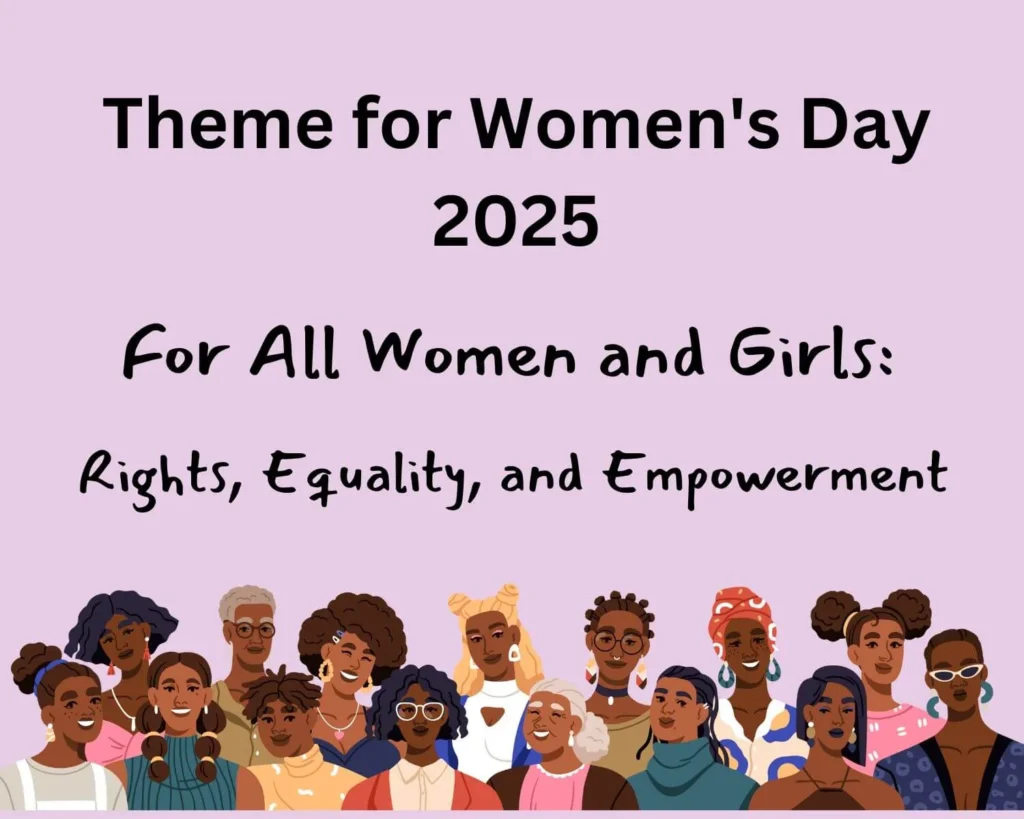
Breaking Down the 2025 Theme:
- Rights – Every woman and girl deserves access to fundamental human rights, including education, healthcare, and legal protection. Women’s rights are human rights.
- Equality – Gender equality means creating a world where women have the same opportunities as men in leadership, employment, education, and social participation.
- Empowerment – Empowering women through education, skill development, entrepreneurship, and leadership roles is key to a progressive society.
This theme highlights the importance of inclusion and diversity, ensuring that no woman—regardless of race, socioeconomic status, disability, or geography—is left behind.
History and Significance of International Women’s Day
Origin of International Women’s Day (IWD)
International Women’s Day (IWD) is one of the most significant global observances dedicated to recognizing the achievements, struggles, and aspirations of women. Its origins can be traced back to the early 20th century when women’s rights movements gained momentum across the world, demanding better working conditions, fair wages, and voting rights.
The Birth of International Women’s Day
- 1908 – The New York Women’s March
The foundation of Women’s Day was laid when 15,000 women marched through the streets of New York City on March 8, 1908, demanding shorter work hours, better pay, and voting rights. Their protest ignited global awareness of women’s struggles. - 1909 – First National Women’s Day in the United States
Inspired by the New York march, the Socialist Party of America declared the first National Women’s Day on February 28, 1909, in the U.S. It was observed until 1913 on the last Sunday of February. - 1910 – The concept of International Women’s Day floated
The concept of International Women’s Day was formally proposed by Clara Zetkin, a German activist, at the Second International Socialist Women’s Conference in Copenhagen. Zetkin suggested that Women’s Day should be observed worldwide on the same date to push for women’s rights and suffrage. - 1911 – First Official Celebration of International Women’s Day
Following Zetkin’s proposal, the first IWD was celebrated on March 19, 1911, in Austria, Denmark, Germany, and Switzerland. Over a million women participated in rallies demanding equal rights. - 1913-1917 – IWD and the Russian Revolution
In 1913, IWD was shifted to March 8, which became the permanent date for the observance. In 1917, during World War I, Russian women held massive protests for “bread and peace,” demanding an end to the war and better conditions. Their strike led to women gaining voting rights in Russia that same year, strengthening IWD’s role as a symbol of women’s empowerment. - 1975 – United Nations Recognition
The United Nations officially recognized March 8 as International Women’s Day during the International Women’s Year in 1975. Since then, the UN has led global campaigns for gender equality, introducing a new theme each year to highlight pressing women’s issues.
Key Milestones in the History of Women’s Rights
The journey of women’s rights has been marked by countless struggles, sacrifices, and triumphs. Here are some of the most significant milestones associated with the history of Women’s Day:
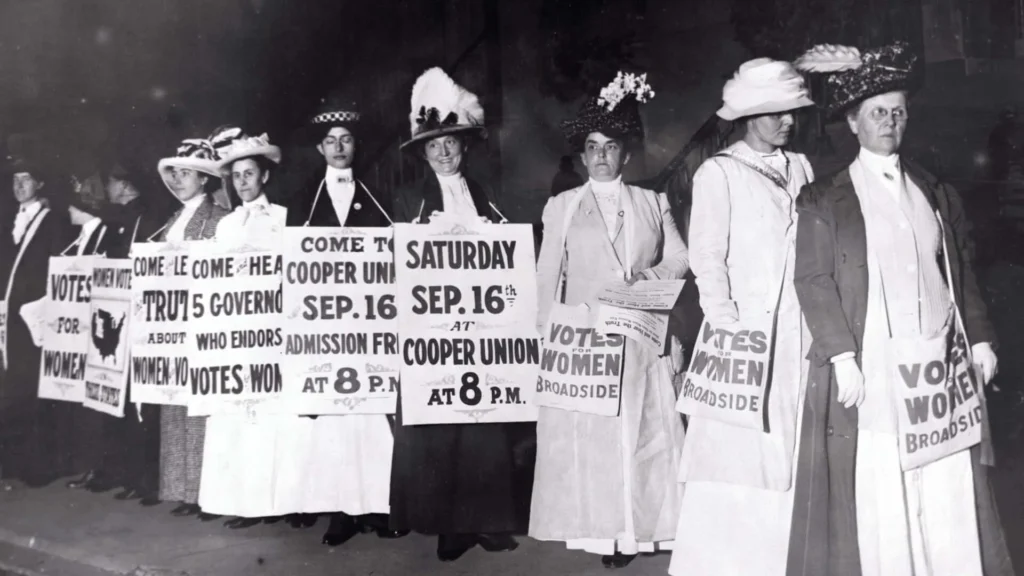
- Women’s Suffrage Movements (19th – 20th Century)
- 1893 – New Zealand made history in 1893 by becoming the first nation to recognize women’s voting rights, setting a global precedent for gender equality in political participation.
- 1920 – The ratification of the 19th Amendment in 1920 marked a historic victory, securing American women’s right to vote after decades of persistent activism and advocacy.
- 1945 – The United Nations Charter recognized gender equality as a fundamental human right.
- Women’s Workforce and Equal Pay Rights
- 1963: The United States enacted the Equal Pay Act to address wage disparities and ensure fair compensation regardless of gender.
- 1979: The United Nations introduced the Convention on the Elimination of All Forms of Discrimination Against Women (CEDAW), a landmark treaty aimed at promoting women’s rights and gender equality worldwide.
- 2015 – The UN Sustainable Development Goals (SDGs) included Gender Equality (Goal 5) as a priority.
- Women’s Rights in Leadership and Politics
- 1960 – Sirimavo Bandaranaike became the first female Prime Minister of Sri Lanka, making history in world politics.
- 1980 – Vigdís Finnbogadóttir became the first elected female President (Iceland).
- 2021 – The U.S. witnessed a historic moment with Kamala Harris becoming the first female Vice President of the country.
- Movements Against Violence and Discrimination
- 1993 – The United Nations formally adopted the Declaration on the Elimination of Violence Against Women, establishing a global framework to combat gender-based violence and protect women’s rights.
- 2017 – The #MeToo Movement gained global attention, highlighting workplace harassment and gender-based violence.
These milestones reflect how far women’s rights have come, but they also emphasize the ongoing need for policy changes, social reform, and empowerment initiatives worldwide.
Role of the United Nations and Global Organizations
The United Nations (UN) and various international organizations play a crucial role in advancing women’s rights and promoting gender equality.
United Nations’ Contribution to Women’s Rights
The UN has been instrumental in shaping global policies for women’s empowerment through its various programs:
- UN Women (2010-Present) – Established to promote gender equality, economic independence, and protection from gender-based violence.
- Commission on the Status of Women (CSW) (1946-Present) – A global body that monitors progress in women’s rights.
- International Women’s Conferences – The UN has hosted multiple conferences to address gender issues, such as:
- 1975 – Mexico City (First World Conference on Women)
- 1995 – Beijing Declaration and Platform for Action (Set global gender equality goals)
- International Campaigns and Initiatives
- HeForShe (2014-Present) – A movement encouraging men to support gender equality.
- 16 Days of Activism Against Gender-Based Violence – An annual campaign promoting women’s safety.
Other Global Organizations Supporting Women’s Rights
- World Economic Forum (WEF) – Publishes the Global Gender Gap Report, measuring gender inequality worldwide.
- International Labour Organization (ILO) – Advocates for women’s labor rights and fair wages.
- UNESCO – Works toward women’s access to education and cultural representation.
- Amnesty International & Human Rights Watch – Fight against gender-based violence and discrimination.
Women’s Achievements and Contributions
Women have played a vital role in shaping history, leaving an indelible mark in politics, science, business, arts, and sports. Despite facing societal barriers, they have overcome obstacles, challenged norms, and redefined possibilities. This section celebrates their contributions and highlights their influence on society and culture.
Contributions in Politics, Science, Business, Arts, and Sports
Women have consistently broken barriers in various fields, proving their capabilities and excellence.
Women in Politics
From leading nations to shaping policies, women have made groundbreaking contributions in politics:
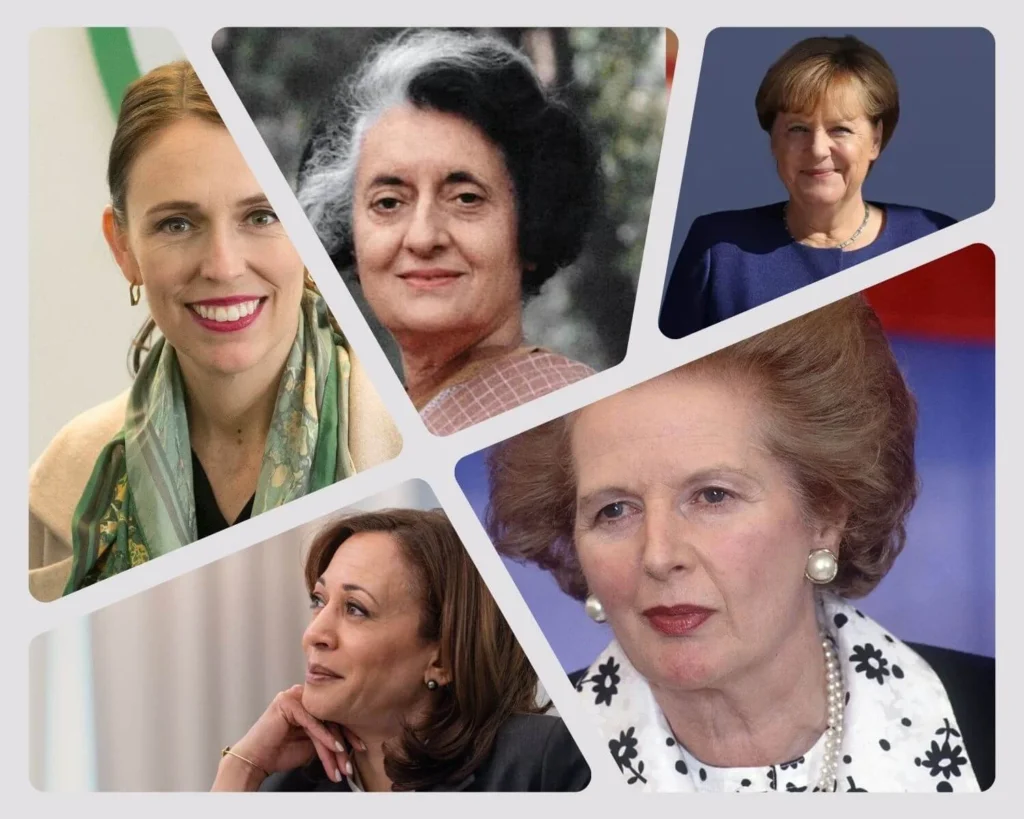
- Indira Gandhi (India) – The first and only female Prime Minister of India, known for her leadership during the Bangladesh Liberation War in 1971.
- Margaret Thatcher (UK) – Nicknamed the “Iron Lady” for her firm and unwavering leadership, she made history as the United Kingdom’s first female prime minister.
- Angela Merkel (Germany) – Served as Germany’s Chancellor for 16 years, making her one of the world’s most influential leaders.
- Jacinda Ardern (New Zealand) – Gained global recognition for her empathetic leadership, especially during crises like the Christchurch Mosque attack and COVID-19 pandemic.
- Kamala Harris (USA) – The first female, first African American, and first Asian American Vice President of the United States.
Women in politics influence policies on education, healthcare, climate change, and human rights, ensuring inclusivity and progress.
Women in Science
Women have revolutionized science and technology, despite historically being denied recognition. Some remarkable figures include:
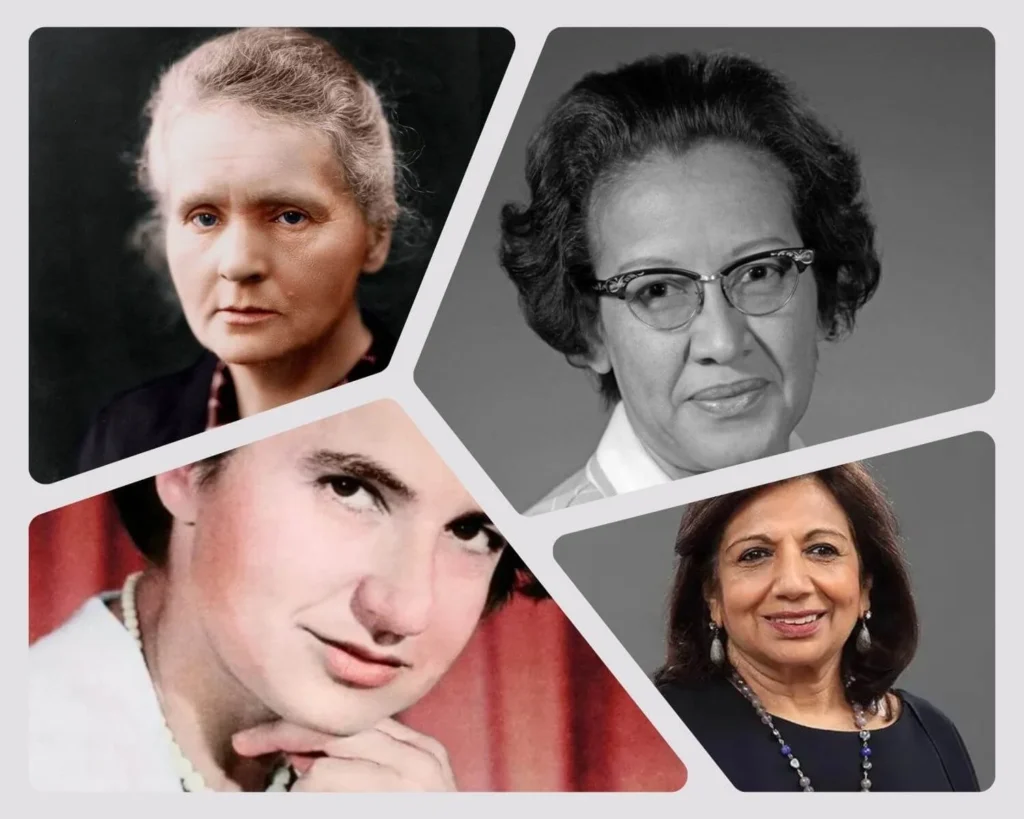
- Marie Curie (Poland/France) – The first woman to win a Nobel Prize and the only person to win in two different scientific fields (Physics & Chemistry) for her pioneering work on radioactivity.
- Katherine Johnson (USA) – A NASA mathematician whose calculations enabled Apollo 11’s successful moon landing.
- Rosalind Franklin (UK) – Played a crucial role in discovering DNA’s double-helix structure, though her contributions were overlooked for years.
- Dr. Kiran Mazumdar-Shaw (India) – Founder of Biocon, one of India’s leading biotech companies, pioneering affordable medicine.
Women in science continue to break barriers in technology, medicine, and space exploration, contributing to humanity’s greatest advancements.
Women in Business
Women entrepreneurs and executives are transforming global economies:
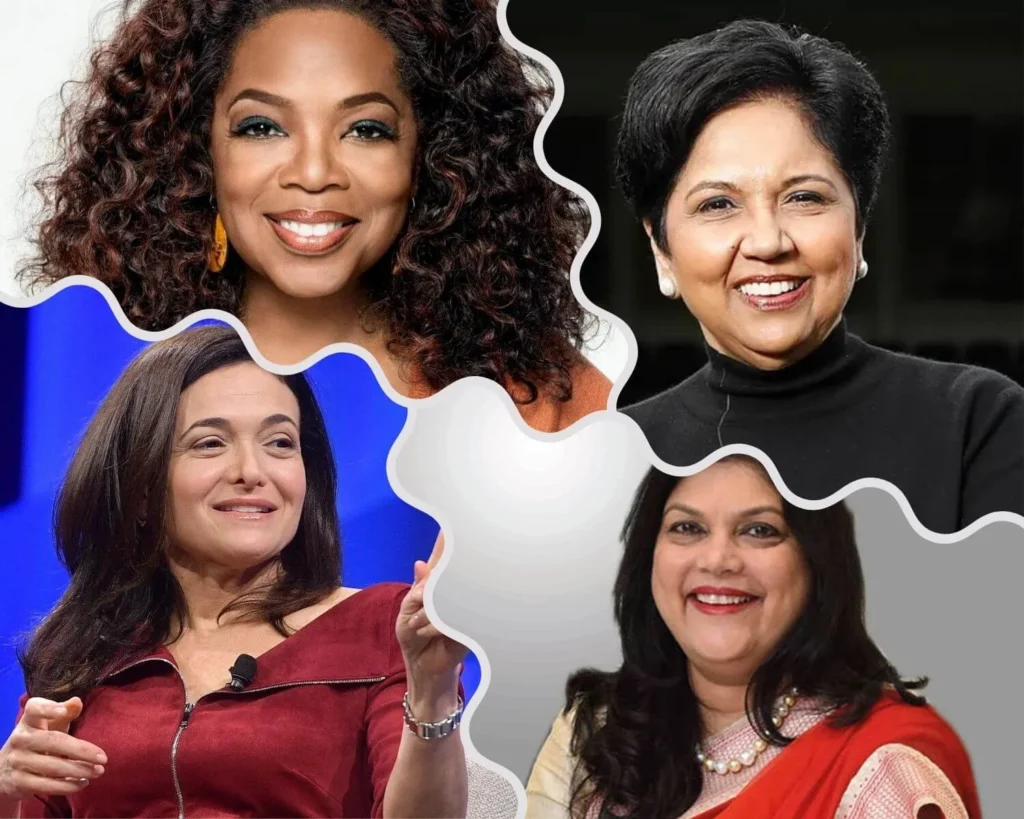
- Oprah Winfrey (USA) – Built a billion-dollar media empire and remains an inspiration for women in business and media.
- Indra Nooyi (India/USA) – Former CEO of PepsiCo, leading the company to global success and advocating for women in leadership.
- Sheryl Sandberg (USA) – Former COO of Meta (Facebook) and author of Lean In, encouraging women’s leadership in the corporate world.
- Falguni Nayar (India) – Founder of Nykaa, an Indian beauty e-commerce giant, proving women’s power in the startup ecosystem.
From leading Fortune 500 companies to launching successful startups, women drive innovation, economic growth, and job creation.
Women in Arts and Literature
Women have made immense contributions to literature, film, music, and visual arts:
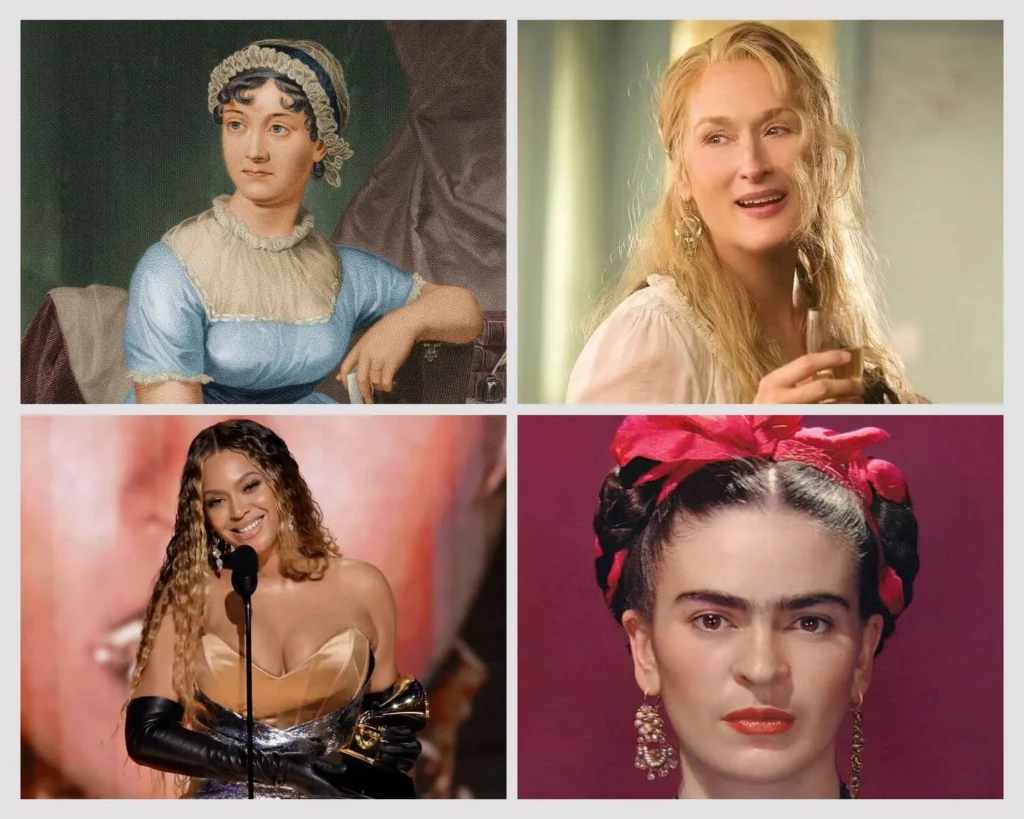
- Jane Austen (UK) – One of the most influential novelists of all time (Pride and Prejudice, Sense and Sensibility).
- Meryl Streep (USA) – One of the most awarded actresses in cinema history.
- Beyoncé (USA) – A global music icon and an advocate for female empowerment.
- Frida Kahlo (Mexico) – A legendary painter known for her deeply personal and symbolic artwork.
Women artists challenge stereotypes, inspire movements, and tell powerful stories that influence cultures worldwide.
Women in Sports
Women athletes have shattered records, broken stereotypes, and inspired millions:
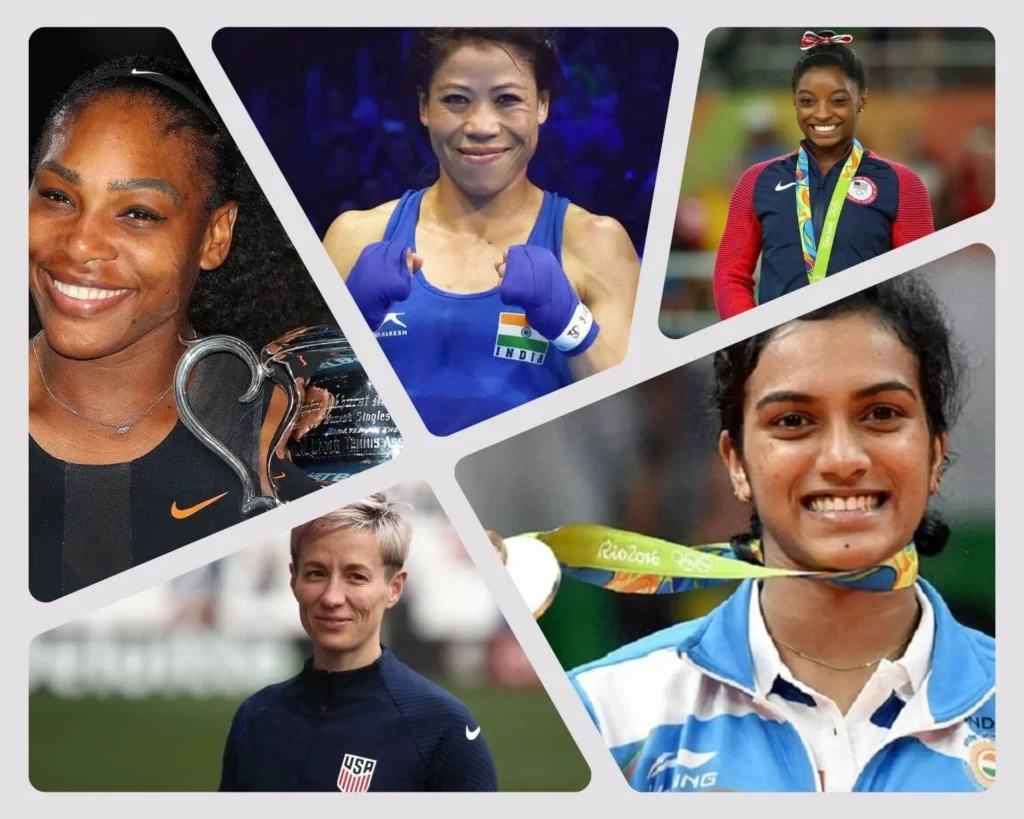
- Serena Williams (USA) – A 23-time Grand Slam winner, considered one of the greatest tennis players of all time.
- Mary Kom (India) – A six-time world boxing champion and Olympic medalist, inspiring female athletes worldwide.
- Simone Biles (USA) – One of the most decorated gymnasts in history.
- Megan Rapinoe (USA) – A footballer and activist, using her platform to fight for gender equality in sports.
- P.V. Sindhu (India) – India’s first female Olympic silver medalist in badminton.
Women in sports prove that talent, determination, and hard work can defy any societal expectation.
Inspirational Stories of Women Pioneers
Beyond famous figures, countless unsung heroines have changed history. Some inspiring stories include:
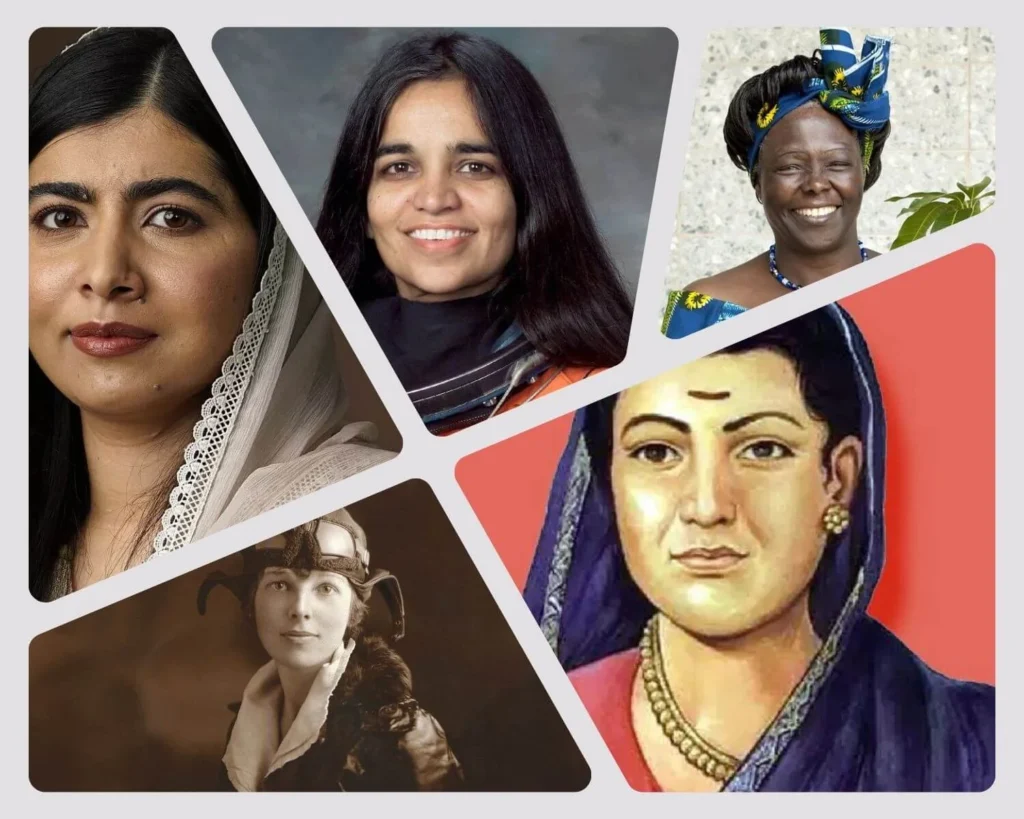
- Malala Yousafzai (Pakistan) – Survived an assassination attempt by the Taliban and became a global advocate for girls’ education.
- Kalpana Chawla (India-USA) – The first Indian-origin woman in space, inspiring future generations in aerospace.
- Wangari Maathai (Kenya) – The first African woman to receive the Nobel Peace Prize for her work in environmental conservation.
- Amelia Earhart (USA) – The first woman to fly solo across the Atlantic, inspiring women in aviation.
- Savitribai Phule (India) – A social reformer who pioneered women’s education in India in the 19th century.
These women exemplify courage, resilience, and leadership, proving that determination can overcome any obstacle.
Women’s Impact on Society and Culture
Women shape societies, cultures, and economies in countless ways:
- Mothers and Caregivers – Women play a crucial role in raising and nurturing future generations.
- Educators and Change-makers – Women are at the forefront of education and social reform, advocating for equal opportunities.
- Tech Innovators – Women like Ada Lovelace and Grace Hopper laid the foundation for modern computing.
- Activists and Human Rights Advocates – Women like Gloria Steinem, Angela Davis, and Tarana Burke (founder of #MeToo) have led social justice movements.
- Community Builders – Women strengthen economies, promote peace, and drive cultural transformation through leadership and advocacy.
Women’s impact is immeasurable—from everyday contributions to world-changing achievements, they continue to redefine boundaries and inspire progress.
Challenges Women Still Face
Despite significant progress in women’s rights and empowerment, gender inequality persists across various spheres, including education, the workplace, leadership roles, and personal safety. Women continue to encounter barriers that limit their opportunities, economic independence, and overall well-being. Addressing these challenges is essential for fostering a truly inclusive and equitable society.

Gender Inequality in Education, Workplace, and Leadership
Gender Inequality in Education
Education is a fundamental right, yet millions of girls worldwide are still denied access to quality education due to cultural, economic, and societal factors.
- In many developing regions, girls are more likely to drop out of school due to early marriages, household responsibilities, or lack of financial resources.
- Gender bias in education discourages girls from pursuing STEM (Science, Technology, Engineering, and Mathematics) fields, which are traditionally male-dominated.
- In conflict zones and marginalized communities, safety concerns, lack of proper sanitation, and gender-based violence further prevent girls from attending school.
Closing the education gap is critical for empowering women and ensuring their active participation in all sectors of society.
Gender Disparities in the Workplace
Even in the modern workforce, women face multiple obstacles that hinder their career growth and financial independence.
- Women are often underrepresented in leadership positions across industries, with a disproportionately low number serving as CEOs, executives, and decision-makers.
- Workplace gender stereotypes limit opportunities, as women are frequently assigned roles that align with traditional expectations rather than merit-based skills.
- Maternity leave and caregiving responsibilities negatively impact career progression, with many women forced to choose between professional growth and family obligations.
- Sexual harassment and workplace discrimination remain significant concerns, affecting women’s productivity and mental well-being.
Enforcing equal opportunities, fair hiring practices, and policies supporting work-life balance is essential to addressing these disparities.
Gender Imbalance in Leadership and Politics
Women continue to face significant underrepresentation in both political offices and executive leadership positions. Despite possessing the skills and competence, they face multiple barriers to attaining influential positions.
- Social and cultural biases discourage women from pursuing leadership roles, often portraying them as less capable than their male counterparts.
- Women in politics frequently encounter gender-based scrutiny, harassment, and resistance, making it difficult to break into the decision-making arena.
- Lack of mentorship and support networks further restricts women’s access to leadership opportunities.
Increasing the representation of women in decision-making roles is crucial for ensuring diverse perspectives and policies that promote gender equity.
Issues Like Wage Gap, Violence Against Women, and Discrimination
Wage Gap and Economic Disparities
The gender wage gap remains a pressing issue worldwide, with women earning significantly less than men for performing the same job roles.
- On average, women earn 20-30% less than men in many countries, even in developed economies.
- The concept of the “glass ceiling” limits women’s ability to rise to top-tier positions, preventing them from receiving equal promotions and salary raises.
- Women often take on unpaid labor, including domestic work and caregiving, which is not economically recognized.
Ensuring pay transparency, stronger labor laws, and equal pay policies is crucial to closing the gender wage gap.
Violence Against Women and Safety Concerns
Violence against women is one of the most serious human rights violations, affecting millions worldwide. It takes many forms, including domestic violence, sexual assault, human trafficking, honor killings, and cyber harassment.
- Domestic violence remains a major issue, with many women lacking the legal protection or support systems to escape abusive relationships.
- Sexual harassment in public spaces and workplaces deters women from fully participating in society.
- Cyber harassment and online abuse disproportionately affect women, leading to mental health issues and social isolation.
- In some cultures, honor-based crimes continue to threaten women’s freedom and autonomy.
Stronger legal frameworks, awareness campaigns, and social support systems are essential to combat violence and ensure women’s safety.
Discrimination and Cultural Barriers
Women face systemic discrimination in various aspects of life, including marriage laws, reproductive rights, and access to opportunities.
- Cultural norms and traditional beliefs often reinforce gender roles, limiting women’s ability to make independent choices.
- Lack of reproductive rights and healthcare access affects women’s autonomy over their own bodies.
- Widowhood and single motherhood are often stigmatized in many cultures, leading to economic and social challenges.
Promoting gender-sensitive policies, legal reforms, and education on women’s rights is key to eliminating discriminatory practices.
The Importance of Legal Rights and Empowerment Initiatives
Strengthening Legal Protections for Women
Legal frameworks play a pivotal role in ensuring gender equality and protecting women’s rights. Governments and international organizations have taken various steps to safeguard women’s interests, including:
- Equal Pay Laws – Implemented in various countries to bridge the wage gap and ensure fair compensation.
- Anti-Harassment and Domestic Violence Laws – Strengthening legal action against offenders and providing support for survivors.
- Maternity and Parental Leave Policies – Encouraging workplace inclusivity and equal parenting responsibilities.
- Property and Inheritance Rights – Empowering women to own assets and achieve financial independence.
While legal advancements have been made, stronger enforcement and global cooperation are needed to ensure these laws are effectively implemented.
Women Empowerment and Grassroots Initiatives
Various non-governmental organizations (NGOs), UN initiatives, and grassroots movements are actively working to uplift women and provide them with opportunities.
- UN Women and Sustainable Development Goals (SDGs) – Aims to achieve gender equality and empower women through education, healthcare, and economic participation.
- Microfinance and Entrepreneurship Programs – Supporting women in developing countries to start their own businesses and gain financial independence.
- Girls’ Education Campaigns – Organizations like Malala Fund advocate for universal access to education for girls.
- Technology and Digital Inclusion – Programs that provide women with digital skills, improving their access to remote work and economic opportunities.
Community-driven initiatives are crucial in empowering women, creating safe spaces, and fostering leadership development.
How to Celebrate Women’s Day
International Women’s Day (IWD) is more than just a day of recognition—it is a powerful reminder of the progress made toward gender equality and the work still needed to ensure that every woman and girl has access to equal rights and opportunities. Celebrating Women’s Day is an opportunity to honor, uplift, and empower women in meaningful ways. Whether through organized events, personal gestures of appreciation, or digital advocacy, there are many ways to make a difference on this important day.
Events and Activities to Participate In
One of the best ways to celebrate Women’s Day is by taking part in local, national, and global events that recognize women’s achievements and highlight ongoing challenges.
Attend or Organize Women’s Day Events
Many communities and organizations host seminars, workshops, and panel discussions featuring inspiring women leaders. These events focus on topics such as gender equality, women’s empowerment, and breaking barriers in various industries.
- Workshops and Conferences – Many institutions organize discussions on women’s rights, leadership, and career growth.
- Charity and Fundraising Events – Support organizations that work for women’s empowerment, education, and health by attending donation drives or charity runs.
- Cultural Programs and Art Exhibitions – Many artists use their platforms to showcase women-centric art, literature, and performances.
If no events are happening in your area, consider organizing one in collaboration with local groups, schools, or businesses.
Support Women-Owned Businesses
Another impactful way to celebrate is by supporting female entrepreneurs. Whether by shopping at women-owned businesses, promoting their services, or investing in their ventures, this action helps uplift women economically.
- Buy from local women-led businesses in industries like fashion, wellness, and technology.
- Choose to eat at restaurants or cafés owned by women.
- Promote their businesses through word of mouth or social media.
Volunteer for Women’s Causes
Many organizations work tirelessly to support women’s rights and well-being. Volunteering time or resources to these causes can make a direct impact.
- Support women’s shelters by donating essential items or volunteering services.
- Offer mentorship to young girls to encourage them to pursue their dreams.
- Participate in health and education initiatives that focus on women’s well-being.
Even small contributions can have a meaningful effect on someone’s life.
Ways to Honor and Appreciate Women in Daily Life
Women’s Day is not just about large-scale events—it is also about showing appreciation for the women in our lives and ensuring that gender equality is a continuous effort.
Acknowledge and Appreciate the Women Around You
A simple yet powerful way to celebrate Women’s Day is by recognizing and appreciating the contributions of women in your family, workplace, and community.
- Express gratitude to the women in your life—mothers, sisters, daughters, colleagues, and friends.
- Give handwritten notes or small gestures of appreciation to recognize their impact.
- Encourage men and boys to actively support and acknowledge women’s efforts.
Recognition and appreciation should go beyond Women’s Day and become part of everyday life.
Promote Gender Equality at Work and Home
True empowerment comes from creating an environment where women feel valued and supported.
- At the Workplace: Ensure fair pay, equal opportunities, and leadership representation for women.
- At Home: Share household responsibilities and encourage equal decision-making in family matters.
- In Society: Challenge stereotypes, advocate for equal rights, and stand against discrimination.
Gender equality begins with individual actions that collectively lead to societal change.
Educate Yourself and Others About Women’s Rights
One of the best ways to honor Women’s Day is to stay informed and spread awareness about gender issues.
- Read books, watch documentaries, and listen to podcasts that focus on women’s experiences.
- Share information with others and engage in meaningful conversations about gender equality.
- Teach children about respect, inclusion, and equal opportunities from an early age.
Knowledge is a powerful tool in challenging biases and inspiring change.
Social Media Campaigns and Advocacy Efforts
Participate in Women’s Day Hashtag Campaigns
Social media plays a vital role in raising awareness and creating conversations about gender equality. On Women’s Day, many organizations and activists run global hashtag campaigns to highlight women’s issues and achievements.
- #InternationalWomensDay – The official hashtag to celebrate the occasion worldwide.
- #EmbraceEquity – A call for inclusive and fair opportunities for all.
- #WomensRightsAreHumanRights – Reinforces the message of gender equality.
By posting stories, photos, or messages under these hashtags, you amplify the voices of women and contribute to a larger movement.
Share Stories of Inspirational Women
Use your platform to celebrate the achievements of women—whether historical figures, modern trailblazers, or women in your own life.
- Highlight the accomplishments of women in science, business, politics, and social activism.
- Share personal stories about women who have inspired you.
- Create infographics or videos to educate others on women’s contributions to society.
Authentic storytelling helps in breaking stereotypes and inspiring change.
Advocate for Policy Changes and Women’s Rights
Women’s Day is also an opportunity to advocate for systemic changes that promote gender equality.
- Sign petitions supporting equal pay, education, and healthcare rights for women.
- Encourage companies and governments to implement stronger policies against discrimination and harassment.
- Support organizations that work toward gender justice and women’s empowerment.
Raising awareness and pressuring policymakers can lead to real and lasting change.
Role of Men and Society in Women’s Empowerment
Women’s empowerment is not solely a women’s issue—it is a societal issue that requires the active participation of all, including men. Gender equality benefits entire communities, economies, and nations by ensuring that everyone, regardless of gender, has equal opportunities and rights. Achieving true empowerment requires dismantling societal biases, promoting fairness in workplaces and homes, and ensuring that policies foster an inclusive environment.

Importance of Gender Equality in Workplaces and Homes
Gender equality is a fundamental human right that promotes fairness, inclusion, and balanced opportunities. Achieving this requires efforts both in professional and personal spaces.
Workplaces: Equal Pay, Leadership, and Opportunities
Despite progress, women still face challenges in workplaces, including pay gaps, fewer leadership opportunities, and bias in hiring and promotions. Creating an equitable workplace means:
- Ensuring Equal Pay – Women must be paid fairly for the same work as men.
- Promoting Women in Leadership – Companies should focus on increasing female representation in decision-making roles.
- Providing a Safe and Inclusive Work Environment – Workplaces should have zero tolerance for harassment and discrimination.
- Supporting Parental Leave and Work-Life Balance – Policies should allow both men and women to share caregiving responsibilities.
By fostering a culture of respect and opportunity, workplaces can empower women to succeed without barriers.
Homes: Equal Responsibilities and Supportive Environments
Gender equality starts at home, where children learn societal norms. Traditional roles have often placed disproportionate household and caregiving responsibilities on women, limiting their time and career opportunities.
- Shared Responsibilities – Housework and childcare should not be solely a woman’s duty. Men can contribute equally by cooking, cleaning, and parenting.
- Encouraging Education and Career Choices – Families should support the education and ambitions of daughters as much as sons.
- Challenging Stereotypes – Parents and educators must teach children that all careers and responsibilities are open to everyone, regardless of gender.
When homes support equality and respect, they set the foundation for a fairer society.
Encouraging Allyship and Support from Men
Men play a crucial role in breaking down gender stereotypes and biases. True empowerment comes when men are active allies rather than passive supporters.
Speaking Up Against Gender Bias
Men can use their voices to challenge sexist comments, discrimination, and harmful gender norms in workplaces, communities, and social circles.
- If a woman is interrupted in a meeting, a male colleague can ensure she gets to finish speaking.
- If someone makes a sexist remark, an ally can challenge the bias rather than ignoring it.
- When hiring or promoting employees, decision-makers should ensure fair treatment for all candidates.
Small actions from individuals create lasting changes in attitudes and norms.
Supporting Women’s Ambitions and Leadership
Men in leadership roles can mentor and sponsor women, ensuring they receive equal opportunities to advance.
- Encourage women to take on leadership roles in professional and community spaces.
- Offer mentorship and training programs to help women grow in their careers.
- Ensure that female voices are heard in meetings and decision-making processes.
Allyship is not about giving women advantages; it is about removing the barriers they unfairly face.
Promoting Respectful Relationships
Gender equality extends beyond the workplace and into personal relationships. Mutual respect, consent, and emotional support are crucial in every relationship.
- Encourage healthy discussions on gender roles and fairness within families.
- Support policies and laws that protect women from domestic violence and workplace harassment.
- Teach younger generations that relationships should be based on equality and mutual respect.
When men and women stand together, they create a stronger and more balanced society.
Promoting Policies for a More Inclusive World
Governments, businesses, and communities must prioritize policies that promote gender equality. Systemic change is only possible when laws and structures support women’s rights.
Education and Skill Development
Access to quality education is one of the most effective ways to empower women. Policies should focus on:
- Increasing school enrollment and retention rates for girls.
- Providing scholarships and training programs to support women in STEM, business, and leadership.
- Ensuring that schools and workplaces have safe environments free from discrimination.
Workplace Equality and Protection
Governments and organizations must enforce policies that:
- Eliminate the gender pay gap through transparency and regulation.
- Mandate parental leave for both mothers and fathers, ensuring caregiving is a shared responsibility.
- Ensure safe working conditions, free from harassment and discrimination.
Legal Protection and Social Welfare
Women need strong legal support to protect their rights. This includes:
- Stronger laws against gender-based violence and harassment.
- Economic programs to support women entrepreneurs and workers.
- Health policies that ensure access to maternal care and reproductive rights.
Change requires both policy shifts and cultural transformation to build an inclusive world.
Conclusion
The journey toward gender equality has made significant strides over the years. Women have gained the right to vote, taken leadership roles, excelled across various fields, and contributed immensely to global development. However, persistent challenges such as the wage gap, workplace discrimination, and gender-based violence continue to hinder true equality. The ultimate goal remains to eliminate these barriers and create a society where women have the same opportunities as men in every sphere of life.
Achieving this requires continuous commitment, not just annual recognition. Women’s empowerment must be a daily effort, involving education about gender equality, challenging biases and stereotypes, recognizing women’s contributions in all fields, and encouraging men to actively support equality. True progress depends on the collective actions of individuals, organizations, and governments.
Every person has a role to play in advancing gender equality, and small actions can make a significant impact. Supporting women-owned businesses, speaking out against discrimination, advocating for equal opportunities in workplaces and education, mentoring and uplifting women in various fields, and pushing for policies that promote gender equality are all meaningful ways to contribute. By actively participating in these efforts, we move closer to a world where every woman and girl can thrive. Women’s empowerment is not just about fairness—it is about building a more just, prosperous, and inclusive future for all.

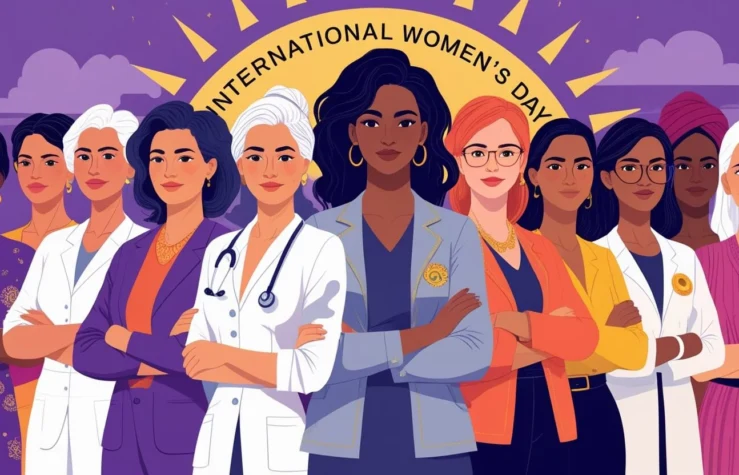



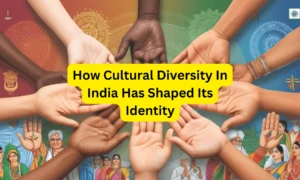

2 Comments